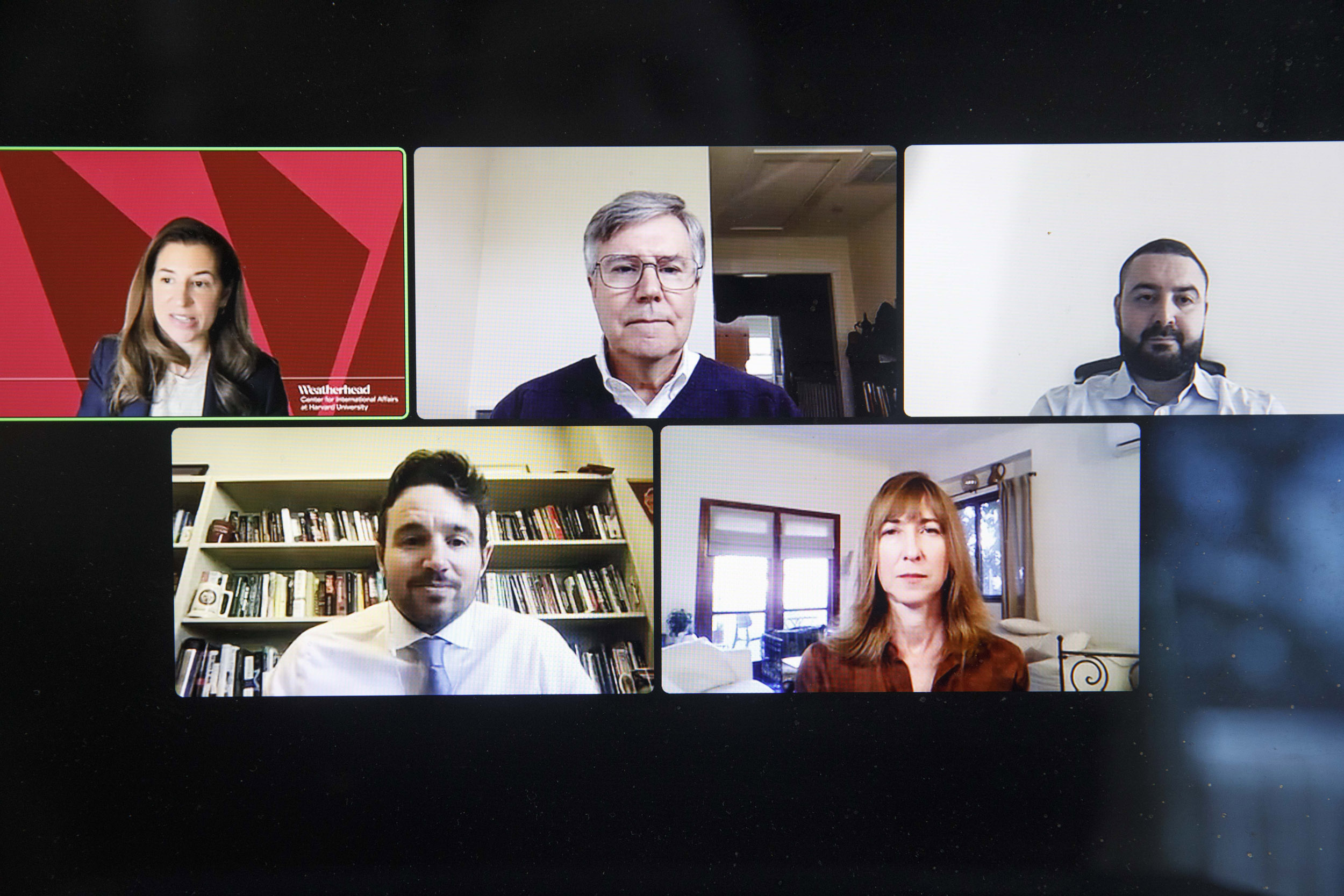
The panel included moderator Melani Cammett, (clockwise from upper left), F. Gregory Gause, Adel Hamaizia, Dahlia Scheindlin, and Peter Krause.
Kris Snibbe/Harvard Staff Photographer
Looking at causes, measuring effects of Israel-Hamas war
Experts examine shifts in geopolitics, global economy resulting from conflict
Fallout from the Israel-Hamas war is being felt throughout the Middle East and the world. Some of the conflict’s causes and effects — from its impact on regional alliances to the global economy — were the topic Wednesday when the Weatherhead Center for International Affairs convened “The War in Israel/Palestine: Geopolitical Dimensions.”
Moderated by Melani Cammett, director of the Weatherhead and Clarence Dillon Professor of International Affairs, the virtual panel drew scholars studying different aspects of the war, which has been raging since Oct. 7, when Hamas terrorists killed 1,200 people and took 253 hostages during an attack on Israel. Since then, an estimated 28,000 Palestinians have been killed in Gaza by the Israeli offensive.
“The enormous violence with which [the conflict] began and the enormous media attention gives the sense that something big is changing,” said F. Gregory Gause, professor of international affairs and John H. Lindsey ’44 Chair of the Bush School of Government and Public Service at Texas A&M University.
However, despite “the enormous human suffering and loss,” Gause believes the war “will end up changing very little” of the current underlying geopolitics of the region.
“The key geopolitical fact that defined the region before Oct. 7 is the role of Iranian actors” in countries that are either weakened or at war, such as Yemen, he pointed out. Noting the unchanged status quo around the Iranian nuclear program, he put forward the theory that, if anything, Iran’s role has been heightened. “Nothing about this conflict changes that,” he said.
Mideast experts say Iran has a long history of training and arming various proxy militias in countries throughout the region, including in Gaza and the West Bank.
Dahlia Scheindlin, a public opinion expert and political analyst from Tel Aviv University, said the conflict has affected some of Israel’s ties in the region as well as with the U.S.
She pointed to Israel’s agreements with its neighbors Egypt and Jordan. “Obviously these aren’t warm relationships, which is why they are under threat.”
However, she noted, a bigger shift might be between the U.S. and Israel on the war. She recalled that while the U.S. had responded to Oct. 7 with a “bear hug,” the strong and seemingly unconditional support that “comes from a very, very deep and personal place from Biden,” now “We do see some reservations.”
Noting internal pressure from progressive Democrats and the necessity of having to woo both those voters and the Arab American vote during this election year, Biden has put “policy behind its statements,” including the sanctioning of settlers accused of anti-Palestinian violence. “This brings us to the point where the U.S. is finally considering ways in which it can use its considerable leverage,” Scheindlin said.
While the geopolitics remain somewhat in flux, Adel Hamaizia, a research fellow in the Middle East Initiative of the Kennedy School’s Belfer Center for Science and International Affairs, noted the economic impact of the conflict in the region and around the world has been crystal clear.
The International Monetary Fund recently downgraded its forecast for growth in the entire Middle East-North Africa (MENA) region. Predicting a region-wide 0.5 percent drop, “It truly is dire,” he said. He blamed this contraction on several factors, including a reduction in oil production and a serious decline in tourism, notably in countries such as Egypt and Jordan “where tourism is a lifeline.”
In addition, the Iran-backed Houthi attacks on shipping are having a disruptive impact. Calling the aggression in the Red Sea “a major maritime chokehold,” Hamaizia said roughly 30 percent of global shipping has been affected, resulting in a 43 percent drop through the Suez Canal and a 60 percent increase around Cape of Good Hope, a longer and vastly more expensive route.
The Houthi attacks, which first targeted Israeli-connected ships and then expanded to include assets from the U.S. and Europe, are expected to increase if Israel’s invasion of Rafah, in Gaza, goes forward, he said, and includes threats to undersea cables.
Experts say destruction of the cables in the Red Sea could disrupt virtually all data and financial communications between Europe and Asia.
Peter Krause, a political science professor at Boston College, says he has taken an “inside-out” perspective of the war and its causes. He dismissed the popular argument that the Oct. 7 attack was an attempt to disrupt the normalization of relations between Saudi Arabia, the U.S., and Israel.
“No doubt Hamas doesn’t want this,” he said. “But the evidence I’ve seen does not support this claim.”
He noted the preparation for the surprise attack began two years ago, and there was no mention of the normalization of relations in Hamas’ 16-page document justifying its assault. “Granted, this is a public relations document,” he said. “But it is a curious omission.”
Instead, Krause argued violation of the Al-Aqsa Mosque, the third-holiest site in Islam located on the Temple Mount in Jerusalem, was the “most common motivation named by Palestinians.” Krause named “the increasing numbers of Jewish visitors and a growing movement to build a third Jewish temple” on the site as key drivers of the attack.
“Hamas is first and foremost a Palestinian nationalist organization,” he said. “But their Islamist orientation drives much of their international alliances and strategy.”
For that reason, he warned that more violence may occur when Ramadan and Passover come in near proximity this spring — and in the future. “Even though this round of conflict will end without anything like a Hamas victory on the ground, it is a model of transnational mobilization and conflict that Hamas and its allies will attempt to build on,” he said.




